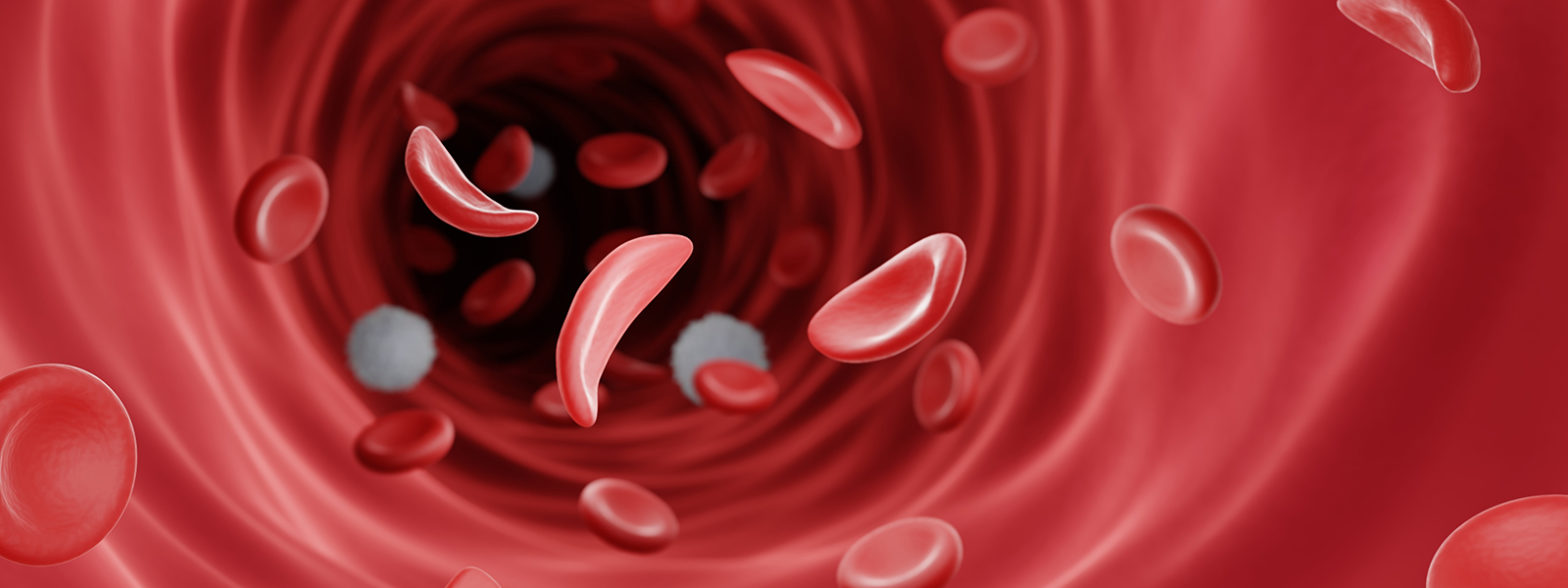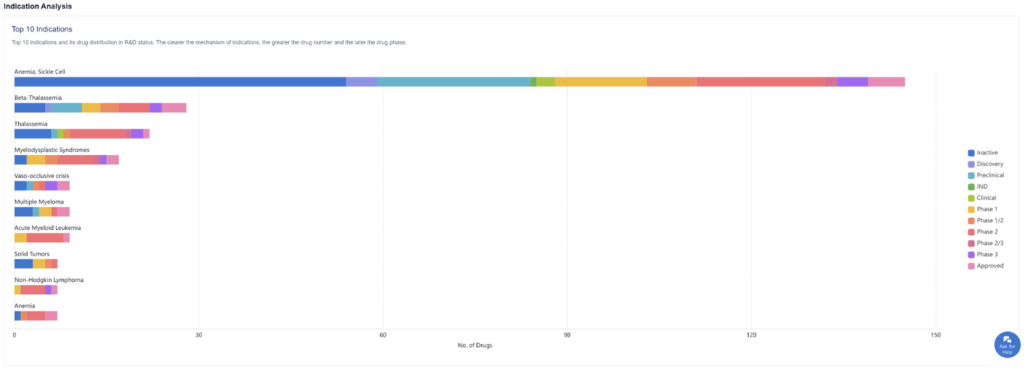
Sickle Cell Disease (SCD) is a group of inherited red blood cell disorders. It’s caused by a genetic defect and occurs when both the mother and father pass down a defective gene.
We curated this article using insights from our Synapse platform. Keep track of advancements in drug developments and clinical trials when you register for Synapse.
Sign Up For Free
Our red blood cells contain a protein called hemoglobin, which is responsible for carrying oxygen throughout our bodies via the cardiovascular system. Normally, red blood cells have a smooth and disk-shaped appearance; with SCD, the red blood cells are stiff and sickle-shaped, limiting the amount of oxygen they’re able to hold and transport and making movement through blood vessels difficult. The sickle shape of the red blood cells also decreases their lifespan: instead of the typical up to 120 days with normal cells, sickle cells die almost 10 times faster, living for just 10 to 20 days. There are many prominent symptoms of SCD, with a few on the list including:
- Anemia, which is lower-than-normal iron levels in the blood.
- Sickle crisis, meaning that the sickle-shaped cells clump together and cause blood vessel blockages that preclude blood from reaching muscles and organs.
- Stroke, with the ischemic type (blockage in blood flow) far more common in SCD than hemorrhagic (uncontrolled bleeding) strokes.
- Jaundice, where the sickle cells die faster than the liver can filter them out, allowing toxins to build up in the body. This causes the skin and whites of the eyes to become tinged yellow from the broken-down bilirubin that builds up from lack of clearance.
Currently, there is no cure for sickle cell, but research and development (R&D) advancements are underway. In this article, we explore news and investments being made in this space.
Sickle Cell News and Investments

Many indications of sickle cell disease can warrant various drugs and treatments, as we can see in the graph above. Sickle cell anemia currently has the most activity in terms of approved drugs compared to their competitors, as well as drugs in later drug phases.
Treatments are advancing and some big players in the industry are feeling the pressure to get into the indication space through acquisitions. One notable acquisition recently is Pfizer acquiring Global Blood Therapeutics for $5.4 billion USD to obtain their pipeline on exciting and promising SCD treatments, some of which include a very key asset drug, GBT601 (a sickle hemoglobin polymerization inhibitor), which is potentially a “functional cure” for SCD. There is much hope and promise surrounding GBT601, as it is currently in the middle stage of a phase II/III trial for SCD. It is a once-daily therapy that can reduce the destruction of red blood cells as well as reduce the occurrence of a vaso-occlusive crisis, which is when red blood cells deprive tissues of oxygen by blocking blood flow. This acquisition adds an extensive pipeline of SCD treatment to Pfizer.
Pfizer is not the only large pharmaceutical giant to be making investments in its pipeline for SCD. In recent news, Novo Nordisk announced it will buy Forma Therapeutics in a deal valued at $1.1 billion USD. This deal marks two major acquisitions in the sickle cell disease space in just 30 days. The second acquisition leads to Novo Nordisk acquiring Forma’s lead drug candidate in the SCD space, Etavopivat. Etavopivat is a selective pyruvate kinase-R activator made to improve anemia and is taken once daily, just like GBT601. As mentioned by Novo Vice President Ludovic Helfgott, this acquisition is not “out of the blue”, as the company is making a large commitment to creating treatments for hematological disorders. The attraction to acquiring Etavopivat is due to its great safety profile and efficacy, its once-a-day usage, and the capability to partner this drug with other treatments.

How do these two acquired companies stack up against one another? If we look at approved clinical drugs, Forma currently has four and Global Blood Therapeutics has 1. However, Global Blood Therapeutics does have significantly more clinical trials; currently, they have 35 ongoing trials, compared to Forma, which only has nine. We can conclude that both acquisitions look favorable for both Pfizer and Novo Nordisk as they are inheriting strong pipelines.
Conclusion
We can expect more investment and advancement in sickle cell disease with both acquisitions mentioned above. These investments and drugs provide hope to individuals looking for treatment for SCD. If you are interested in learning more about this space or keeping track of drug development and clinical trials, try Synapse for free.
Hot Topics on DiscoverySelf driving
Machine learning
Edge computing
Electric vehicle
Blockchain
Biofuel
Image sensor
Nanotechnology
Robotics
Raw material
Discovery Company ranking List
Electric VehicleAC asynchronous motor
Permanent Magnet Synchronous Motor
Switched reluctance motor
Lithium-ion battery
NiMH battery
Other batteries
Electric vehicle transmission
Power exchange
Charging Station
Energy absorption
SemiconductorPhotomask
Etching
Lithography
Wafer
CMP
Film Forming
Logic circuit
Memory
Processor
Integrated circuit design
Medical DeviceMedical imaging
Radiation Therapy
Cancer screening
Gene sequence
Rehabilitation
Ultrasound
Blood purification
Dentistry
Ophthalmology
Biochemical detection
Hot Companies on DiscoveryApple, Inc.
Dynamic Network Services, Inc.
Oracle America, Inc.
Sensormatic Electronics LLC
Ikeda Bussan Co. Ltd.
Huawei Technologies Co., Ltd.
ZTE Corp.
Mitsubishi Electric Engineering Co., Ltd.
Samsung Electronics Co., Ltd.
QUALCOMM, Inc.
Federal Home Loan Mortgage Corp.
Federal National Mortgage Association
Siemens AGUnitedHealth Group, Inc.
General Electric Co.
The AES Corp.
Marriott International, Inc.
Shell Plc
Welltower, Inc.
HCA Healthcare, Inc.
WestConnex Pty Ltd.
Meituan
Thermo Fisher Scientific, Inc.
Sea
Cruise
Air Canada
Lineage Logistics LLC
Atieva, Inc.
National Treasury Management Agency
Universal Music Group, Inc.
